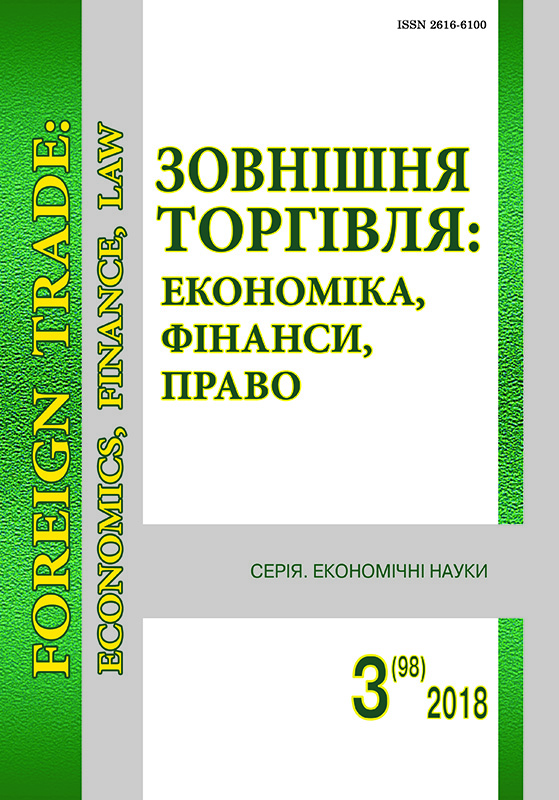Overcoming barriers in international trade through simplification of customs procedures
Keywords:
customs procedures, customs, «Electronic customs», «Single window», customs post-audit, customs procedures selectivity, risk analysis and management.Abstract
Background. The process of globalization as a mechanism for self-development of the world economy is a stimulating factor for further acceleration of cross-border cooperation and trade. Ukraine’s policy aimed at the European integration processes and the liberalization of foreign economic activity are important for the development of the domestic economy. Customs procedures simplification is crucial on the road map of the strategic development of state customs affairs. Ukrainian custom should comply with the principles of transparency and objectivity, introduce the best practices of European countries and promote the investment attractiveness of our country.
Analysis of recent research and publications. Theoretical and practical aspects of simplification of customs procedures, world experience of its introduction into the practice of customs control and clearance were studied both by scientists and practitioners. However, a number of issues concerning the highlighting of the modern trends of customs regulation efficiency improving, the prospects of the further development of «customs-to-business»partnership and the creation of a favorable business climate required more detailed study.
The aim of the study is to analyze the main directions of customs procedures simplification at realization of the state customs affairs in Ukraine and to mark the ways of their improvement taking into account the European integration priorities.
Materials and methods. The study was conducted using general scientific methods, such as the systematic approach, theoretical generalization and comparison, analysis and synthesis. The information background of the study is scientific articles, statistical materials.
Results. The main directions of simplification and harmonization of the customs procedures in Ukraine with the use of information technologies within the framework of the structure of «Electronic Customs»were analyzed. An assessment of the contemporary state and prospects of using the electronic declaration procedure, customs control implementation and clearance under the principle of the «Single window», customs post-audit application and functioning of the institution of authorized economic operator were carried out. The advantages and consequences of customs procedures simplifying for the «customs-to-business» partnership development were described.
Conclusion. In the context of European integration processes, the priorities in the realization of the state customs affairs are directly related to the increased efficiency of customs control and clearance of goods. Customs procedures in Ukraine are based on international standards, but our country's positions in the international trade rankings remain low. It is necessary to implement a strategy aimed at the use of innovative technologies, automation and simplification of customs procedures. It will help to transform Ukraine into one of the most attractiveness economies for doing business. Modern trends of improving the efficiency of customs regulation and creating a favorable business climate should continue according to the best international practices with preserving the balance of the state’s and business’s interests.
References
The Global Enabling Trade Report 2016. World Economic Forum. URL : http://www3.weforum.org/docs/WEF_GETR_2016_report.pdf.
Pashko P. V. Mytni informacijni tehnologii’. Kyi’v : Znannja, 2011. 391 s.
Berezhnjuk I. G. Mytne reguljuvannja Ukrai’ny: nacional’ni ta mizhnarodni aspekty. Dnipropetrovs’k : Akad. myt. sluzhby Ukrai’ny, 2009. 543 s.
Mel’nyk T. M., D’jachenko O. V. Instytucional’ne zabezpechennja mytnogo reguljuvannja Ukrai’ny v umovah jevrointegracii’. Zovnishnja torgivlja: ekonomika, finansy, pravo. 2017. № 4 (93). S. 5–15.
Muratov I., Mesecha I. Elektronne deklaruvannja tovariv. Visnyk. Oficijno pro podatky. 2014. № 27. URL : http://www.visnuk.com.ua/ua/pubs/id/7257.
Desjatnjuk O. M., Harkavyj M. O. Novitnja paradygma realizacii’ mytnogo kontrolju v umovah sproshhennja mytnyh procedur. Elektronne naukove fahove vydannja «Efektyvna ekonomika». 2015. № 3. URL : http://nbuv.gov.ua/UJRN/efek_2015_3_4.
Brachuk A. O. Osoblyvosti zabezpechennja mytnoi’ bezpeky ta mytnyh interesiv v umovah sproshhennja mytnyh procedur. Lex Portus : juryd. nauk. zhurn. 2017. № 1. C. 156–167. URL : http://dspace.onua.edu.ua/handle/11300/7798.
Koljada S. P., Rjaboj V. I. Udoskonalennja e-mytnyci – zaporuka rozvytku mytnoi’ spravy v Ukrai’ni. Biznes Inform. 2016. № 3. S. 238–243.
Shtal’ T. V. «Elektronna mytnycja» – jakisno novyj etap nadannja mytnyh poslug v Ukrai’ni. Nauk. visn. Poltav. un-tu ekonomiky i torgivli. 2013. № 1. S. 101–105.
Fedotov O. P. Jedyne vikno – lokal’ne rishennja. Molodyj vchenyj. 2016. № 2. S. 217–220.
Ivashhuk I. Naprjamy ta perspektyvy konvergencii’ mytnyh vidnosyn u global’nomu prostori. Galyc’. ekon. visn. 2010. № 4(29). S. 24–30.
Oficijnyj veb-sajt Derzhavnoi’ fiskal’noi’ sluzhby Ukrai’ny. URL : http://sfs.gov.ua.
Mytnyj kodeks Ukrai’ny : Zakon Ukrai’ny vid 13.03.2012 № 4495-VI. URL : http://zakon4.rada.gov.ua/laws/show/4495-17.
Likarchuk K. «Jedyne vikno» jak zasib borot’by z korupcijeju. URL : https://www.pravda.com.ua/columns/2015/07/10/7074022.
Dejaki pytannja realizacii’ pryncypu «jedynogo vikna» pid chas zdijsnennja mytnogo, sanitarno-epidemiologichnogo, veterynarno-sanitarnogo, fitosanitarnogo, ekologichnogo, radiologichnogo ta inshyh vydiv derzhavnogo kontrolju : postanova Kabinetu Ministriv Ukrai’ny vid 25.05.2016 № 364. URL : http://zakon5.rada.gov.ua/laws/show/364-2016-p.
Fedchyshyn Ju. Jedyne mytne vikno: ne zupynjatysja na dosjagnutomu. URL : https://dt.ua/macrolevel/yedine-mitne-vikno-ne-zupinyatisya-na-dosyagnutomu-_.html.
Mizhnarodna konvencija pro sproshhennja i garmonizaciju mytnyh procedur vid 18.05.1973. URL : http://zakon2.rada.gov.ua/laws/show/995_643.
Vakul’chyk O. M. Vykorystannja dosvidu JeS u pobudovi systemy zakonodavchogo ta metodychnogo zabezpechennja mytnogo post-audytu v Ukrai’ni. Ekonomichni nauky. 2012. № 2. S. 11–22.
Fabijans’ka V. Ju., Bloha A. M. Ukrai’ns’kyj mytnyj post-audyt, nablyzhennja do jevropejs’kyh norm ta standartiv. Elektron. nauk. fahove vyd. «Efektyvna ekonomika». 2015. № 4. URL : http://www.economy.nayka.com.ua/?op=1&z=3988.
Bilous-Osin’ T. I. Proces stanovlennja upovnovazhenogo ekonomichnogo operatora jak sub’jekta mytnogo prava: mizhnarodnyj dosvid. Administratyvne pravo i proces. 2014. № 2 (8). S. 181–189. URL : http://applaw.knu.ua/index.php/arkhiv-nomeriv/2-8-2014.
Merezhko N., Kaluga N., Ocheret A. Instytut upovnovazhenogo ekonomichnogo operatora v Ukrai’ni. Zovnishnja torgivlja: ekonomika, finansy, pravo. 2016. № 2. S. 5–4.
Implementacija Ugody pro asociaciju: rezul’taty ta podal’shi kroky. URL : http://dia.dp.gov.ua/wp-content/uploads/2017/11/Імплементація-Угоди-про-асоціаціюУкраїна-ЄС.pdf.



